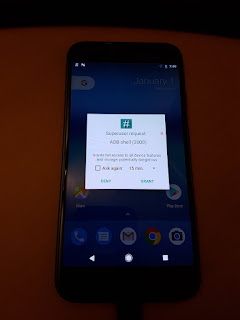Chainfire Roots Pixel, Systemless Root To Be Available Soon
Legendary Android developer Chainfire has finally rooted the Google Pixel. To report the same, Chainfire took to Twitter and uploaded a snapshot which showcases a SuperSU pop up asking for permission to allow a root access request. SuperSU is a root management tool for rooted Android devices, which allows to enable or disable the root access permission to applications.
Quoting from one of our very own Joey Huab's earlier posts:
There are 2 ways to root a device:
1. systemless mode (no need for custom kernel, SuperSU will patch stock kernel)
2. system-mode (custom kernel needed, SELinux needs to be permissive)
Prior to Android Marshmallow, any device could be rooted by simply modifying the /system partition and then by including some init scripts in the system partition. The init scripts would then be executed when the phone boots up, setting in a set of changes (at the boot-up time) which are required to gain root access.
Post the release of Android Marshmallow it became difficult to gain root access because with the introduction of dm-verity by Google, it became impossible to modify the /system partition. To swift past this barrier, Chainfire developed a workaround which involved modification of the RAMDisk. RAMDisk is a partition image file which mounts various system images into the device's memory, with the help of which the device boots up. In order to modify the RAMDisk, one needs to modify the boot image (boot.img) which contains the RAMDisk. To be able to modify the boot image, we need to have unlockable bootloaders. The kernel is responsible for loading the RAMDisk into the device's memory.
Initially there were a lot of rumours doing the rounds that the Pixel devices (especially those from Verizon) will pack in bootloaders which cannot be unlocked. Thus, this made many Android enthusiasts dwell up the rumour that to be able to root Pixel devices, we will have to look for newer methods. However, after Google and Verizon individually confirmed that the Pixel devices will come with unlockable bootloaders, the Android community breathed a sigh of relief.
Come Nougat, Google went one step ahead of us and merged the RAMDisk into the /system partition. Thus if one intends to stick to the rooting methodologies followed in Marshmallow, we need to somehow be able to modify the RAMDisk located inside /system. Now there is only one way to make the modification of the RAMDisk happen, disable dm-verity so that the system files can be modified.
Victory is mine! Full systemless root achieved. Boot image mods only, /system fully intact, dm-verity switchable. #pixel— Chainfire XDA (@ChainfireXDA) October 28, 2016
In various attempts that Chainfire made to root the Google Pixel, he was initially poised to believe that disabling dm-verity would be impossible and that to do so one needs to make changes to the kernel (system wide root). Do remember that the kernel is responsible for loading the RAMDisk into the device's memory. But somehow Chainfire was able to disable dm-verity and get root access on the Pixel with the help of modification of the boot image.
System mode root access will also be available once we have a set of custom kernels in for the Pixel devices.
Source: Chainfire
Chainfire Roots Pixel, Systemless Root To Be Available Soon
 Reviewed by Krittin Kalra
on
10/28/2016 11:28:00 AM
Reviewed by Krittin Kalra
on
10/28/2016 11:28:00 AM
 Reviewed by Krittin Kalra
on
10/28/2016 11:28:00 AM
Reviewed by Krittin Kalra
on
10/28/2016 11:28:00 AM
Subscribe To Us
Get All The Latest Updates Delivered Straight To Your Inbox For Free!

